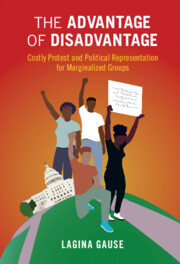Book contents
- Frontmatter
- Dedication
- Contents
- List of Figures
- List of Tables
- Acknowledgments
- 1 The Promise of Protest
- 2 Costly Protest and Political Representation
- 3 How Legislators Perceive Collective Action
- 4 How the Average Legislator Responds
- 5 The Limits of Costly Protest
- 6 Costly Protest in a Digitized World
- 7 The Democratic Value of Costly Protest
- 8 Appendices
- Bibliography
- Index
- Books in the Series
1 - The Promise of Protest
Published online by Cambridge University Press: 17 February 2022
- Frontmatter
- Dedication
- Contents
- List of Figures
- List of Tables
- Acknowledgments
- 1 The Promise of Protest
- 2 Costly Protest and Political Representation
- 3 How Legislators Perceive Collective Action
- 4 How the Average Legislator Responds
- 5 The Limits of Costly Protest
- 6 Costly Protest in a Digitized World
- 7 The Democratic Value of Costly Protest
- 8 Appendices
- Bibliography
- Index
- Books in the Series
Summary
This chapter grounds the manuscript’s argument in debates about persisting inequalities in participation and representation. It starts with an overview of collective action in the United States. It describes how American colonists united in collective action events like the Boston Tea Party to demand representation in the British Parliament and how those efforts led to the Declaration of Independence and the First Amendment to the US Constitution, which proclaim the legitimacy and right of protest.
Next, the chapter provides definitions for protest, collective action, resource disparities, and protest costs. The chapter also describes differences in protest costs for groups of different resource capacities. It discusses why legislators might be responsive to protest efforts, particularly those by lower-resource groups. Finally, the chapter describes how the book will develop the central argument that legislators are most likely to support the protest demands of politically marginalized groups.
Keywords
- Type
- Chapter
- Information
- The Advantage of DisadvantageCostly Protest and Political Representation for Marginalized Groups, pp. 1 - 18Publisher: Cambridge University PressPrint publication year: 2022

